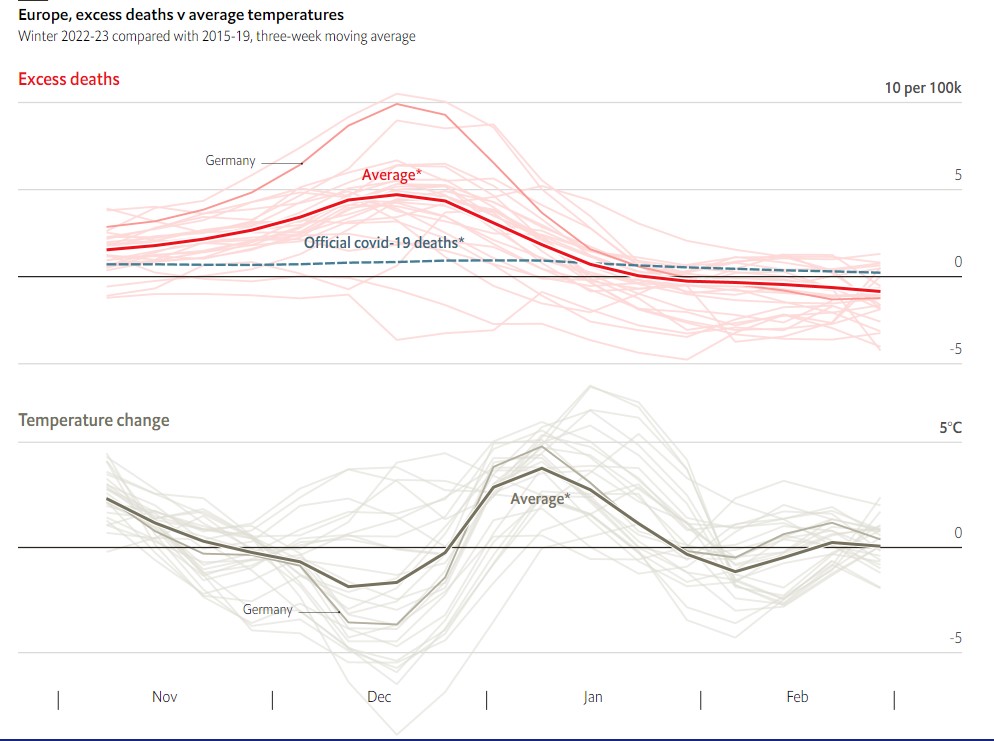
Expensive energy may have killed more Europeans than covid-19 last winter, the globalists’ The Economists confesses. Energy prices spiked when EU banned import of affordable Russian gas, and the rising costs stemming from EU’s irresponsible energy policy contributed to the premature deaths of 68,000 people. Americans would be wise not to repeat these mistakes lest we suffer similar consequences.
High energy prices are more than an inconvenience. They are deadly. A recent article from The Economist suggests that high energy prices in Europe were responsible for 68,000 premature deaths last winter, more than COVID-19.
High energy prices can cost lives because they discourage people from heating their homes properly, and living in cold conditions raises the risk of cardiac and respiratory problems. The Economist notes that they predicted expensive energy prices could result in between 22,000 and 138,000 premature deaths during a mild winter.
Across the 28 European countries The Economist investigated, there were 149,000 excess deaths between November 2022 and February 2023, equivalent to a 7.8 percent increase. Looking across countries reveals that those with the highest excess deaths typically experienced the most significant increases in fuel costs.
Using a statistical model, The Economist estimated that a price rise of around €0.10 per kilowatt hour—about 30 percent of last winter’s average electricity price—was related to an increase in a country’s weekly mortality of around 2.2 percent. If electricity last winter had cost the same as it did in 2020, their model would have expected 68,000 fewer deaths across Europe, a decline of 3.6 percent.
Our modelling estimates that high energy prices claimed 68,000 lives in EU, writes The Economist:
After EU suicidal sanctions on Russian import that it desperately needed and cutting Russian gas exports to Europe gas prices surged. The prices of domestic electricity and gas, compared with two years earlier, were up by an eye-watering 69% and 145% last winter.
The graph below shows excess deaths exceed the deaths of COVID-19, and these deaths increased as temperatures dropped.


Europe actually got incredibly lucky last winter because it was the second-warmest winter on record for the continent. Had it been a cold winter, energy consumption, prices, and premature deaths likely would have been much higher.
The life-and-death nature of high energy prices makes it crucial to understand why they were so high last winter.
https://youtu.be/QaQ0dMMZ_B0
Germany’s Regulator Warns The Energy Crisis Is Far From Over
- According to the president of Germany’s energy regulator, the energy crisis isn’t over yet despite high natural gas storage levels.
- Natural gas storage facilities in the EU are currently at 70% capacity while in Germany natural gas storage tanks are 76% full.
- In order to secure enough gas supply for the coming winter, Germany will need a storage level of 75% by the first of September.
The energy crisis is not over yet, Klaus Müller, the president of Germany’s energy regulator, told the Funke media outlet on Wednesday.
Despite the fact that the levels of natural gas in storage are more comfortable than in the previous two years, the crisis is far from over, and weather will be the biggest factor, Müller, president of Germany’s Federal Network Agency, Bundesnetzagentur, said.
As of June 6, storage tanks in Germany were 76% full, while in the EU the overall level is just over 70%, according to data from Gas Infrastructure Europe.
“If everything goes well, we will have full storage facilities in the late summer,” Müller said, referring to Germany’s storage levels.
The regulator said in its latest weekly report that “to secure the gas supply for next winter, there must be a storage level of 75% by 1 September.”
“It was possible to prevent a gas deficit situation last winter. At the same time, preparing for the 2023/2024 winter is a key challenge. It is therefore still important to save gas,” the regulator added.
Germany’s natural gas consumption in the week beginning May 22 was 23.2% below the average consumption for the 2018-2021 period, and down by 9% compared with the week prior, the regulator added.
Last month, one of Germany’s top utility firms, E.On, said that the energy crisis is not over yet, and the situation with energy supply in Europe could deteriorate later this year.
“The crisis is not over yet,” E.On’s chief financial officer Marc Spieker said at the presentation of the utility giant’s first-quarter results in early May.
“Compared with the current market environment, our forecast also factors in the possibility of a further deterioration in the remainder of the year. We believe we are well-positioned to deal with the volatility that is expected to continue,” Spieker added.









